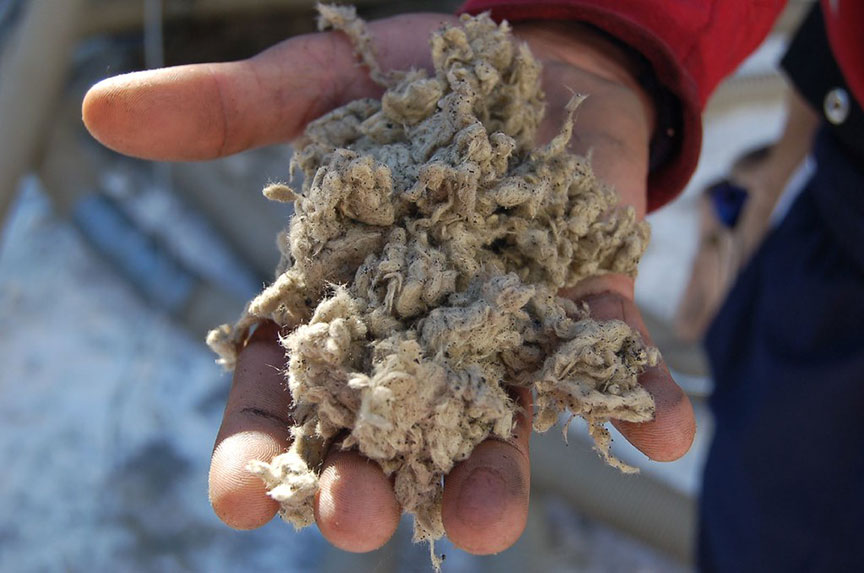
Yes, mineral wool is vegan. It has nothing to do with sheep’s wool and is not made from other animal ingredients. But, it may not be your most eco-friendly option.
Read on to learn how mineral wool is made, what it’s used for, as well as some environmental concerns. I’ll also list some alternatives to mineral wool that are vegan as well.
What is mineral wool?
Mineral wool refers to any fibrous material made from drawing or spinning various molten minerals.
These minerals include:
- Recycled glass
- Basalt rock (igneous rock that is solidified lava)
- Slag (recycled waste from the steel industry)
- Bauxite (sedimentary rock with high aluminum content)
- Olivine sand
There are many types of mineral wool and even more names for it. Mineral wool may also be called rock wool, stone wool, glass wool, slag wool, mineral fiber, mineral cotton, mineral fibre, man-made mineral fiber (MMMF), and man-made vitreous fiber (MMVF).
How is mineral wool made?
Minerals like the ones listed above are heated in a furnace into a molten lava. A spinning machine then whips the lava into thin strands, much like a cotton candy machine. The strands form tufts and a binding solution is added to hold them together. The tufts are also sprayed with oil (not sure what kind) to add water resistance.
The puffy stone wool is then stacked in several layers and compressed by rollers to create a denser material. This new dense wool is baked in an industrial oven to cure the binders which maintain the wool’s shape.
What is mineral wool used for?
Mineral wool’s water-resistant and fire-resistant properties make it useful in a variety of industrial and consumer applications. Consumer applications include soundproofing, thermal insulation, and as a hydroponic growth medium.
I first came across mineral wool while looking for ways to soundproof my home recording studio. I wondered if it was vegan, and wanted to share the answer with others.
However, although mineral wool is technically vegan, it may not be the most eco-friendly solution for your project.
Environmental concerns
Although mineral wool has some “green” aspects, like potentially recycling industrial waste and making homes more energy efficient through its use, it also has some downsides which have recently been in the news.
Most often, mineral wool furnaces run on burning coal. Coal-fired manufacturing plants including ones that manufacture mineral wool, release dozens of substances known to be extremely harmful to human health. This kind of air pollution has been linked to heart and lung disease, cancer, asthma, neurological problems, and global warming, among other environmental impacts.
When mineral wool comes into contact with moisture, it can also release odors into surrounding spaces.
If you are installing mineral wool, be aware that just like with fiberglass, skin contact with mineral wool may cause itching and/or a rash.
Eco-friendly, vegan sound-proofing and thermal insulation materials.
I tried to find some alternatives to mineral wool that are also vegan. The construction sector is not one that I’ve researched a lot yet as far as animal testing. I did rule out a few obvious candidates, but here are the best options I’ve found so far. I will update this list if I get more information.
- Frost King No Itch Cotton Insulation – made from recycled denim.
- UltraTouch™ Denim Insulation – made from 80% post-consumer recycled denim and other cotton.
- Peacemaker Sound Barrier – made from recycled rubber tires, from at least 80% post-consumer recycled waste.
- Thermacork – made from cork, a natural, renewable, recyclable, and biodegradable resource.
- Blown-in cellulose – made from recycled newsprint that is treated to resist fire and mold.
- DIY AirCrete
- airkrete® GREENsulation™
What are some vegan, eco-friendly materials you have used for insulation? Let us know in the comments.

Scarlett Carson
September 30, 2020Thanks for the article, it’s really interesting and helpful. I’ll be searching for the alternatives you mentioned in my area (Leeds). I’m looking to insulate under my kitchen cabinets, I was considering just stuffing loads of newspaper under there, behind the kickboards, but we’ll see. Thanks again for sharing this! Scarlett
Rebecca
September 30, 2020Hi Scarlett, Thank you for the nice feedback. I’m so glad you found the article helpful. I really wasn’t sure if anyone else was ever going to google this! If you find a good solution for your cabinets I would love to hear about it.